- Home
- Terry Brooks
The First King of Shannara Page 8
The First King of Shannara Read online
Page 8
They were silent then, lost in their separate thoughts, mulling over his words and the misgivings they generated. But there was no help for it. He had told them what was necessary, and there was nothing else to say. They would understand better, perhaps, when this matter was done.
So they sat in the darkness and glanced surreptitiously at the shimmering surface of the lake, their faces bathed in the weak light as they listened to the silence and waited for the dawn to draw closer.
And when at last it did, when it was time to go, Bremen rose and faced his companions with a small smile, then went past them wordlessly and down into the Valley of Shale.
Once more, his progress was slow. He had come this way before, but familiarity did not aid where the terrain was so treacherous. The rock underneath was slippery and loose at every point, and the edges were sharp enough to cut. He picked his way carefully, testing each step on the uncertain surface. His boots crunched and ground on the rock, the sound echoing in the deep silence. From west where the clouds massed thickest, thunder rumbled ominously, signaling the approach of a storm. Within the valley, there was no wind, but the smell of rain permeated the dead air. Bremen glanced up as a flicker of lightning splintered the black skies, then repeated its pattern farther north against the backdrop of the mountains. Dawn would bring more than the sunrise this day.
He reached the bottom of the valley and slogged forward at a more rapid pace, his footing steadier on the level ground. Ahead, the Hadeshorn glimmered with silvery incandescence, the light reflecting from somewhere below its flat, still surface. He could smell death here, an unmistakable mustiness, an arid and fetid decay. He was tempted to look back to where the others waited, but knew he must not distract himself even in that small way. He was already running through the ritual he must follow when he reached the lakeshore—the words, the signs, the conjuring acts that would bring the dead to speak with him. He was already hardening himself against their debilitating presence.
All too soon he stood upon the edge of the lake, a frail, small figure in a vast arena of rock and sky, all withered skin and old bones, the strongest part of him his determination, his stubborn will. Behind him, he could hear again the rumble of thunder from the approaching storm. Overhead, the clouds began to roil, stirred to movement by the winds that bore on their back the coming rain. Below, he could feel the earth shiver as the spirits sensed his presence.
He spoke to them softly, calling out his name, his history, his reason for coming to speak with them. He made the signs with his arms and hands, made the gestures that would summon them from the world of the dead to the world of the living. He saw the waters begin to stir in response, and he quickened his pace. He was confident and steady; he knew what would follow. First came the whispers, soft and distant, rising like invisible bubbles from the waters. Then came the cries, long and deep. The cries increased in volume, growing from a few to many, rising in tenor and impatience. The waters of the Hadeshorn hissed with dissatisfaction and need, and began to roil as rapidly as the clouds overhead, stirred by their own coming storm. Bremen gestured to them, bade them respond. The learning he had mastered in his studies with the Elves buttressed and enabled him, a bedrock on which to build the summoning magic. Answer me, he called to them. Open to me.
Spray flew out of the center of the now violent waters, rising in a fountain, collapsing back, rising again. A rumble sounded deep within the earth, a groan of dissatisfaction. Bremen felt the first trace of doubt steal into his heart, and it was with an effort that he forced himself to ignore it. He could feel a vacuum forming around him, spreading out from the lake to encompass the whole of the valley. Only the dead would be allowed within its perimeter—the dead, and the one who had summoned them.
Then the spirits began to rise from the lake: small, white filaments of light given vaguely human form, bodies bathed in a firefly radiance that glimmered against the blackness of the clouded night. The spirits spiraled out of the mist and spray snake-like, lifting from the dark, dead air of their afterlife home to visit briefly the world they had once inhabited. Bremen kept his arms raised in a warding gesture, feeling vulnerable and bereft of power, though he had done the summoning, though he had brought the spirits to life. Cold ran down his brittle limbs in a rush, ice water through his veins. He held himself firm against the fear that raced through him, against the whispers that asked accusingly: Who calls us? Who dares?
Then something huge broke the water’s surface at its exact center, a black-cloaked figure that dwarfed the smaller glowing forms, scattering them with its coming, soaking up their fragile light and leaving them whirling and twisting like leaves in the wind. The cloaked figure rose to stand upon the dark, churning waves of the Hadeshorn, only vaguely substantial, a wraith without flesh or bones, yet of firmer stuff than the smaller creatures it dominated.
Bremen held himself steady as the dark figure advanced. This was whom he had come to see; this was the one he had summoned. Yet he was no longer certain he had done the right thing. The cloaked form slowed, so close now that it blotted out the sky above and the valley behind. Its hood lifted, and there was no face, no sign of anything within the dark robes.
It spoke, and its voice was a rumble of discontent.
—Do you know me—
Flat, dispassionate, and empty, a question without a question’s inflection, the words hung upon the silence in a lingering echo.
Bremen nodded slowly in response. “I do,” he whispered.
At the rim of the valley, the four he had left behind watched the drama unfold. They saw the old man stand upon the shores of the Hadeshorn and summon the spirits of the dead. They saw the spirits rise amid the roiling of the waters, saw their glowing forms, the movement of their arms and legs, the twisting of their bodies in a macabre dance of momentary freedom. They watched as the huge, black-robed form lifted from their midst, enveloping them in its wake, absorbing their light. They watched the figure advance to stand before Bremen.
But they could hear nothing of what they saw. Within the valley, all was silent. The sounds of the lake and the spirits were closed away. The voices of the Druid and the cloaked figure, if they spoke, were inaudible. They could hear only the wind that rushed past their ears and the beginning patter of raindrops on the crushed stone. The expected storm was breaking, rolling out of the west in a mass of dark clouds, descending on them with sheets of rain. It reached them at the same moment the cloaked figure reached Bremen, and it swallowed everything in an instant’s time. The lake, the spirits, the cloaked figure, Bremen, the whole of the valley—all were gone in the blink of an eye.
Risca growled in dismay and glanced quickly at the others. They were cloaked now against the storm, hunched down within their coverings like crones bent with age. “Can you see?” he demanded anxiously.
“Nothing,” Tay Trefenwyd answered at once. “They’re gone.”
For a moment, no one moved, uncertain what they should do. Kinson peered through the downpour’s haze, trying to distinguish something of the shapes he thought he could just make out. But everything was shadowy and surreal, and there was no chance of making sure from where they stood.
“He may be in trouble,” Risca snapped accusingly.
“He told us to wait,” Kinson forced himself to say, not wanting to be reminded of the old man’s instructions when he feared so for him, but not willing to ignore his promise either.
Rain blew into their faces in sudden gusts, choking them.
“He is all right!” Mareth cried out suddenly, her hand brushing the air before her face.
They stared at her. “You can see them?” Risca demanded.
She nodded, her face lowered into shadow. “Yes.”
But she could not. Kinson was closest to her and saw what the others missed. If she was seeing Bremen, it was not through her eyes. Her eyes, he realized in shock, had turned white.
Within the Valley of Shale, no rain fell, no wind blew, nothing of the storm penetrated. There was for Br
emen no sense of anything beyond the lake and the dark figure that stood upon it before him.
—Speak my name—
Bremen took a deep breath, trying to still the trembling of his limbs and the rush of cold that filled his chest. “You are Galaphile that was.”
It was an expected part of the ritual. A spirit summoned could not remain unless its name was spoken by the summoner. Now it could stay long enough to give answers to the questions Bremen would ask—if it chose to answer at all.
The shade stirred, suddenly restless.
—What would you know of me—
Bremen did not hesitate. “I would know whatever you would tell me of the rebel Druid Brona, of he who has become the Warlock Lord.” His voice was shaking as badly as his hands. “I would know how to destroy him. I would know what is to come.” His voice died away in a dry rattle.
The Hadeshorn hissed and spit as if in response to his words, and the moans and cries of the dead rose out of the night in a strident cacophony. Bremen felt the cold stir anew in his chest, a snake coiling as it prepared to strike. He felt the whole of his years press down upon him. He felt the weakness of his body betray the strength of his determination.
—You would destroy him at any cost—
“Yes.”
—You would pay any price to do so—
Bremen felt the snake within spring deep into his heart. “Yes,” he whispered in despair.
The spirit of Galaphile spread its arms as if to enfold the old man, as if to shelter and protect him.
—Watch—
Visions began to appear against the black spread of its cloaked form, taking shape within the shroud of its body. One by one, they materialized out of the darkness, vague and insubstantial, shimmering like the waters of the Hadeshorn with the coming of the spirits. Bremen watched the images parade before him, and he was drawn to them as to light in darkness.
There were four.
In the first, he stood within the ancient fortress of Paranor. All around him there was death. No one lived within the Keep, all slain by treachery, all destroyed by wicked stealth. Blackness cloaked the castle of the Druids, and blackness stirred within its shadows in the form of assassins waiting, a deadly force. But beyond that blackness shone with gleaming certainty the bright, shimmering medallion of the High Druids, awaiting his coming, needful of his touch, an image of a hand raised aloft with a burning torch—the cherished Eilt Druin.
The vision vanished, and he soared now across the vast expanse of the Westland. He looked down, amazed, unable to account for his flight. At first he could not determine where he was. Then he recognized the lush valley of the Sarandanon and beyond, the blue expanse of the Innisbore. Clouds obscured his vision momentarily, changing everything. Then he saw mountains—the Kensrowe or the Breakline? Within their mass were twin peaks, fingers of a hand split outward from each other in a V shape. Between them a pass led to a vast cluster of fingers, all jammed together, crushed into a single mass. Within the fingers was a fortress, hidden away, ancient beyond imagining, a place come out of the time of faerie. Bremen swooped down into its blackness and found death waiting, though he could not spy out its face. And there, within its coils, lay the Black Elfstone.
This vision vanished, too, and now he stood upon a battlefield. The dead and wounded lay all about, men from all the Races and things from no race known to man. Blood streaked the earth, and the cries of the combatants and the clash of their weapons rang out in the fading gray light of a late afternoon sky. Before him stood a man, his face turned away. He was tall and blond. He was an Elf. He carried in his right hand a gleaming sword. Several yards farther away was the Warlock Lord, black-robed and terrible, an indomitable presence that challenged all. He seemed to wait on the tall man, unhurried, confident, defiant. The tall man advanced, raising high the sword, and beneath the gloved hand on the weapon’s handle was the insignia of the Eilt Druin.
One last vision appeared. It was dark and clouded and filled with sounds of sorrow and despair. Bremen stood once more in the Valley of Shale before the waters of the Hadeshorn. He faced anew the shade of Galaphile, watching as the smaller, brighter spirits swirled about it like smoke. At his side was a boy, tall and lean and dark, barely fifteen, so solemn he might have been in mourning. The boy turned to Bremen, and the Druid looked into his eyes . . . his eyes . . .
The visions faded and were gone. The shade of Galaphile drew itself into a tighter coalescence, masking away the images, stealing away the brief light they had given. Bremen stared, blinking, wondering at what he had witnessed.
“Will these happen?” he whispered to the shade. “Will they come to pass?”
—Some have come to pass already—
“The Druids, Paranor . . .?”
—Do not ask more—
“But what can I . . .?”
The shade gestured, dismissing out of hand the old man’s questions. Bremen caught his breath as bands of iron tightened around his chest. The bands released, and he swallowed down his fear. Spray flew from the Hadeshorn in a bright geyser, diamonds against the black velvet night.
The shade began to recede.
—Do not forget—
Bremen lifted his hand in a futile effort to slow the other’s departure. “Wait!”
—A price for each—
The old man shook his head in confusion. A price for each? Each what? For whom?
—Remember—
Then the Hadeshorn boiled anew, and the ghost sank slowly back into the churning waters, drawing down with it all of the brighter, smaller spirits that had accompanied it. Down they went in a rush of spray and mist, amid cries and whimpers from the dead, back to the netherworld from which they had come. Water exploded in a massive column as they disappeared, breaking apart the silence and dead air in a frightening explosion.
Then the storm came flooding in, with wind and rain, with thunder and lightning, hammering into the old man. Bremen went down with the blow, felled in an instant.
Eyes open and staring, he lay senseless at the water’s edge.
Mareth reached him first. The men were larger and stronger, but her footing was surer on the damp, slippery rock, and she fairly flew across its polished surface. She knelt immediately and cradled the old man in her arms. Rain poured down relentlessly, pocking the now smooth, quiet surface of the Hadeshorn, washing down the black, glistening carpet of the valley, turning the dawn light hazy and vague. It soaked through Mareth’s cloak to her skin, chilling her, but she ignored it, her small features twisting in concentration. Her face lifted to the darkened skies and her eyes closed. The other three slowed as they reached her, uncertain what was happening. Her arms tightened about Bremen. Then she shuddered violently and slumped forward, and the men rushed ahead to catch her. Kinson lifted her away from Bremen, while Tay picked up the old man, and in a knot they fought their way back through the downpour and out of the Valley of Shale.
Once clear, they found shelter in a grotto they had passed on their way in. There they laid the girl and the old man on the stone floor and wrapped them in their cloaks. There was no wood for a fire, so they were forced to remain sodden and chilled, waiting out the rain. Kinson checked for heartbeat and pulse and found both strong. After a time, the old man came awake, then almost immediately after, the girl. The three watchers crowded around Bremen to ask what had happened, but the old man shook his head and told them he did not wish to speak just yet. They left him reluctantly and moved away again.
Kinson paused beside Mareth, thinking to ask what she had done to Bremen—for it seemed clear that she had done something—but she glanced up at him and turned away immediately, so he abandoned the attempt.
The day brightened marginally, and the rains moved on. Kinson shared the food he carried with the others. Only Bremen would not eat. The old man seemed to have retreated somewhere deep inside himself—or perhaps he was still somewhere back within that valley—staring at nothing, his seamed, weathered face an expressionless mask.
Kinson watched him for a time, searching for some sign of what he was thinking, failing in his effort to do so.
Finally the old man looked up as if just discovering they were there and wondering why, then beckoned them to sit close to him. When they were settled, he told them of his meeting with the shade of Galaphile and of the four visions he had been shown.
“I could not decide what the visions meant,” he concluded, his voice weary and rough-edged in the silence. “Were they simply prophecies of what is to come, a future already decided? Were they the promise of what might be if certain things were done? Why were these particular visions selected by the shade? What response is expected of me? All these questions, left unanswered.”
“What price are you being asked to pay for your involvement in all of this?” Kinson muttered darkly. “Don’t forget that one.”
Bremen smiled. “I have asked to be involved, Kinson. I have put myself in the position of being protector of the Races and destroyer of the Warlock Lord, and I do not have the right to ask what it will cost me if my efforts succeed.
“Still,” he sighed, “I believe I understand something now of what is required of me. But I will need help from all of you.” He looked at them in turn. “I must ask you to put yourselves in great danger, I’m afraid.”
Risca snorted. “Thank goodness. I was beginning to think nothing at all would come of this adventure. Tell us what we must do.”
“Yes, best to get started with this journey,” Tay agreed, leaning forward eagerly.
Bremen nodded, gratitude reflected in his eyes. “We are agreed that the Warlock Lord must be stopped before he subjugates all of the Races. We know that he has tried and failed once already, but that this time he is stronger and more dangerous. I told you that because of this I believe he will attempt to destroy the Druids at Paranor. The first vision suggests that I was right.” He paused. “I am afraid perhaps that it has already come to pass.”

 The Talismans of Shannara
The Talismans of Shannara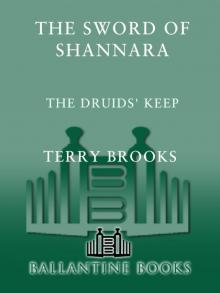 The Sword of Shannara: The Druids' Keep: The Druids' Keep
The Sword of Shannara: The Druids' Keep: The Druids' Keep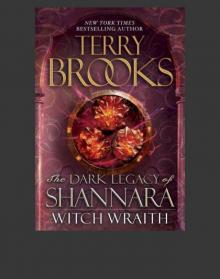 Witch Wraith
Witch Wraith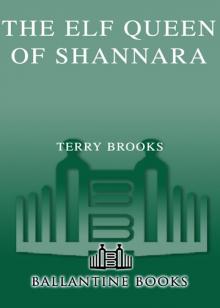 The Elf Queen of Shannara
The Elf Queen of Shannara The Weapons Master's Choice
The Weapons Master's Choice The Scions of Shannara
The Scions of Shannara Armageddon's Children
Armageddon's Children The Sword of Shannara Trilogy the Sword of Shannara Trilogy
The Sword of Shannara Trilogy the Sword of Shannara Trilogy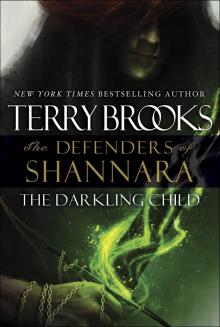 The Darkling Child
The Darkling Child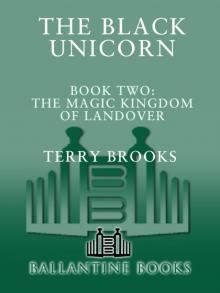 The Black Unicorn
The Black Unicorn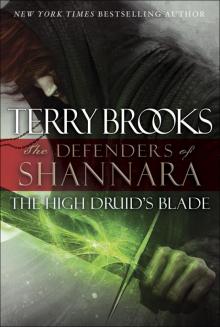 The High Druid's Blade
The High Druid's Blade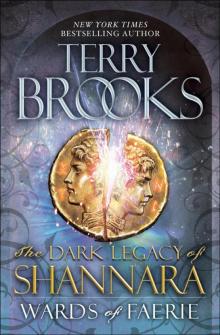 Wards of Faerie
Wards of Faerie The Tangle Box
The Tangle Box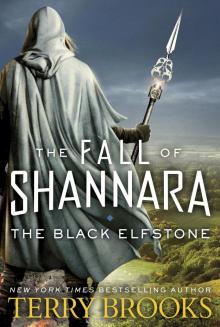 The Black Elfstone
The Black Elfstone The Black Irix
The Black Irix The Elfstones of Shannara
The Elfstones of Shannara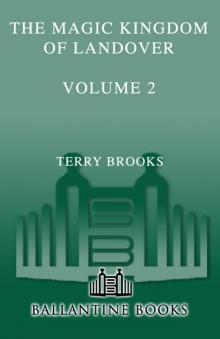 The Magic Kingdom of Landover Volume 2
The Magic Kingdom of Landover Volume 2 Bearers of the Black Staff
Bearers of the Black Staff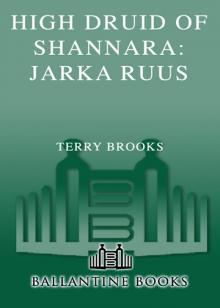 Jarka Ruus
Jarka Ruus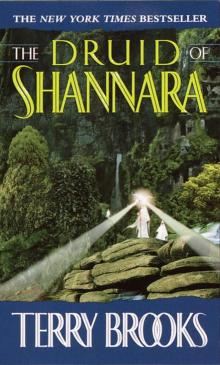 The Druid of Shannara
The Druid of Shannara The Sword of Shannara
The Sword of Shannara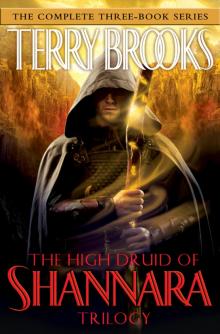 The High Druid of Shannara Trilogy
The High Druid of Shannara Trilogy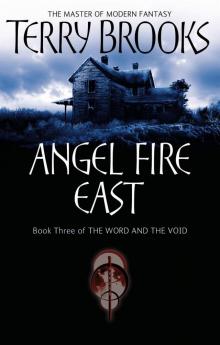 Angel Fire East
Angel Fire East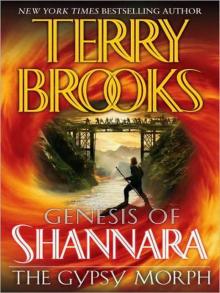 The Gypsy Morph
The Gypsy Morph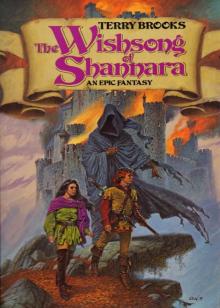 The Wishsong of Shannara
The Wishsong of Shannara Magic Kingdom for Sale--Sold
Magic Kingdom for Sale--Sold Running With the Demon
Running With the Demon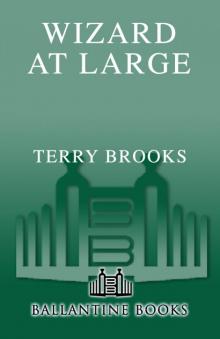 Wizard at Large
Wizard at Large The Sorcerer's Daughter
The Sorcerer's Daughter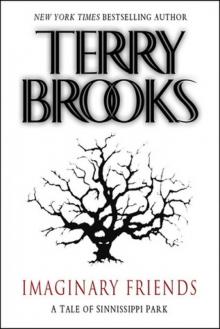 Imaginary Friends
Imaginary Friends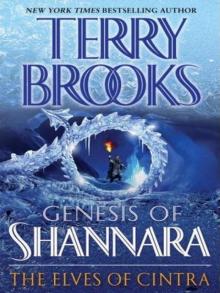 The Elves of Cintra
The Elves of Cintra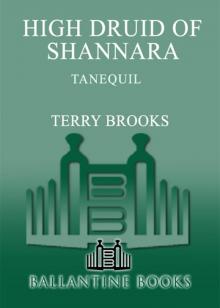 Tanequil
Tanequil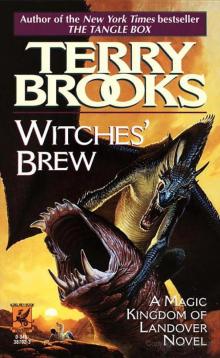 Witches' Brew
Witches' Brew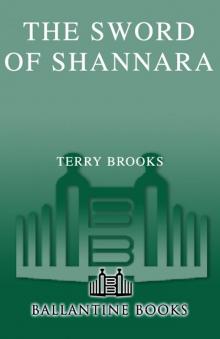 The Sword of the Shannara and the Elfstones of Shannara
The Sword of the Shannara and the Elfstones of Shannara The World of Shannara
The World of Shannara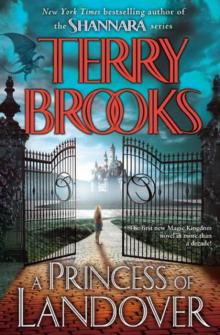 A Princess of Landover
A Princess of Landover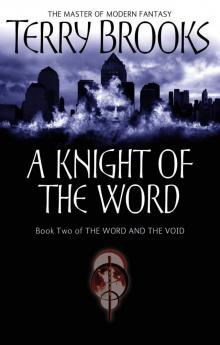 A Knight of the Word
A Knight of the Word Straken
Straken The Skaar Invasion
The Skaar Invasion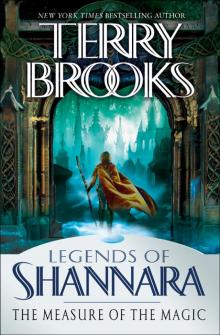 The Measure of the Magic: Legends of Shannara
The Measure of the Magic: Legends of Shannara Ilse Witch
Ilse Witch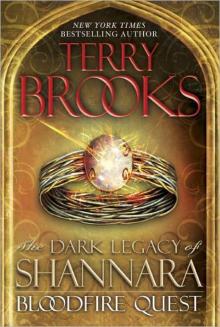 Bloodfire Quest
Bloodfire Quest The Stiehl Assassin
The Stiehl Assassin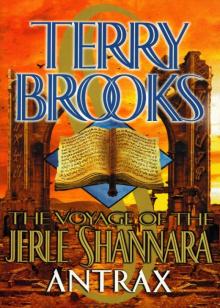 Antrax
Antrax The Last Druid
The Last Druid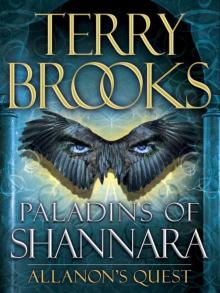 Paladins of Shannara: Allanon's Quest
Paladins of Shannara: Allanon's Quest Sometimes the Magic Works: Lessons From a Writing Life
Sometimes the Magic Works: Lessons From a Writing Life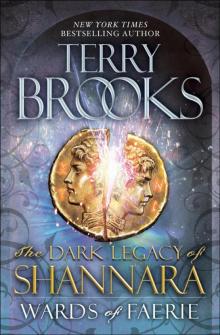 Wards of Faerie: The Dark Legacy of Shannara
Wards of Faerie: The Dark Legacy of Shannara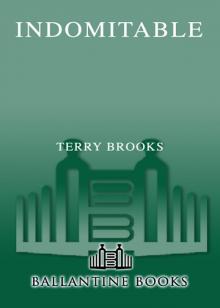 Indomitable: The Epilogue to The Wishsong of Shannara
Indomitable: The Epilogue to The Wishsong of Shannara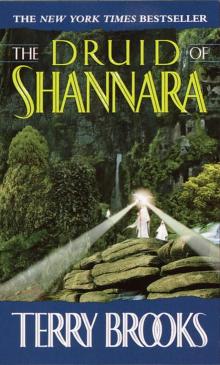 Heritage of Shannara 01 - The Druid of Shannara
Heritage of Shannara 01 - The Druid of Shannara Star Wars - Phantom Menace
Star Wars - Phantom Menace The Dark Legacy of Shannara Trilogy 3-Book Bundle
The Dark Legacy of Shannara Trilogy 3-Book Bundle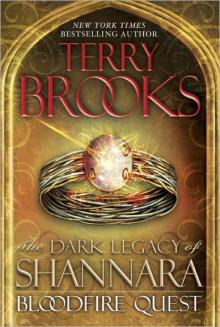 The Bloodfire Quest
The Bloodfire Quest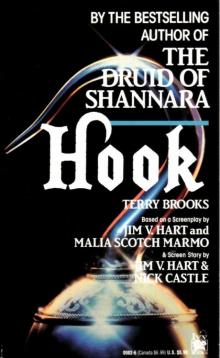 The Hook (1991)
The Hook (1991) Star Wars: Episode I: The Phantom Menace
Star Wars: Episode I: The Phantom Menace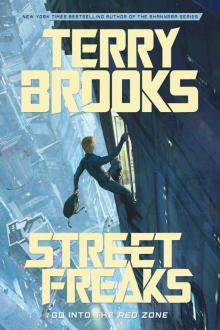 Street Freaks
Street Freaks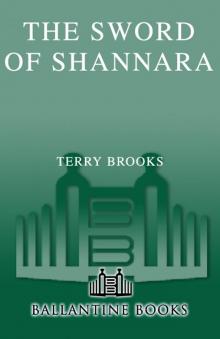 The Sword of Shannara & Elfstones of Shannara
The Sword of Shannara & Elfstones of Shannara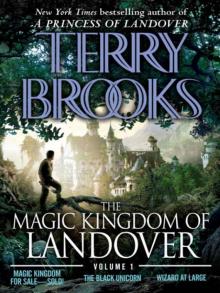 The Magic Kingdom of Landover , Volume 1
The Magic Kingdom of Landover , Volume 1 The Phantom Menace
The Phantom Menace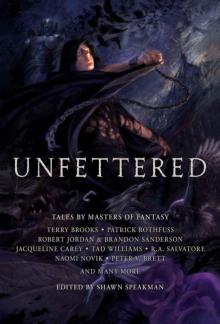 Unfettered
Unfettered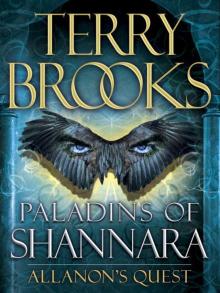 Allanon's Quest
Allanon's Quest Paladins of Shannara: The Weapons Master's Choice
Paladins of Shannara: The Weapons Master's Choice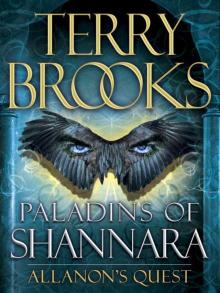 Terry Brooks - Paladins of Shannara - Allanon's Quest (Short Story)
Terry Brooks - Paladins of Shannara - Allanon's Quest (Short Story) Star Wars Episode I: The Phantom Menace (star wars)
Star Wars Episode I: The Phantom Menace (star wars)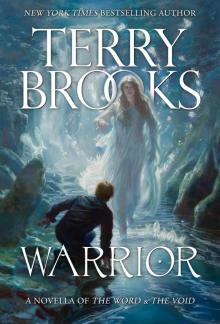 Warrior (The Word and the Void)
Warrior (The Word and the Void)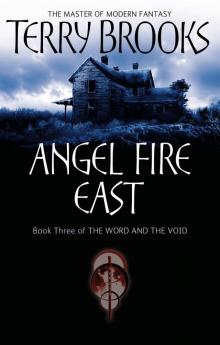 Word & Void 03 - Angel Fire East
Word & Void 03 - Angel Fire East![[Magic Kingdom of Landover 05] - Witches' Brew Read online](http://i1.bookreadfree.com/i2/04/05/magic_kingdom_of_landover_05_-_witches_brew_preview.jpg) [Magic Kingdom of Landover 05] - Witches' Brew
[Magic Kingdom of Landover 05] - Witches' Brew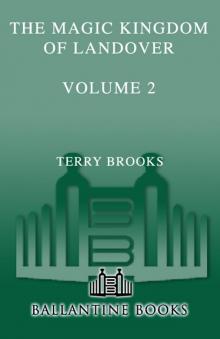 The Magic Kingdom of Landover - Volume 2
The Magic Kingdom of Landover - Volume 2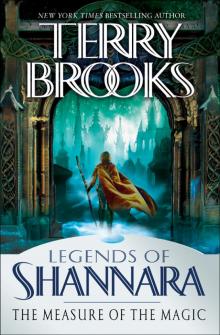 The Measure of the Magic
The Measure of the Magic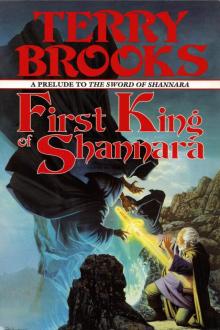 The First King of Shannara
The First King of Shannara Sometimes the Magic Works
Sometimes the Magic Works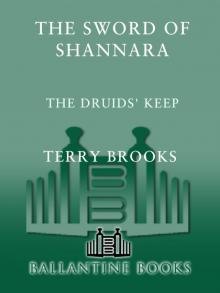 The Sword of Shannara, Part 2: The Druids' Keep
The Sword of Shannara, Part 2: The Druids' Keep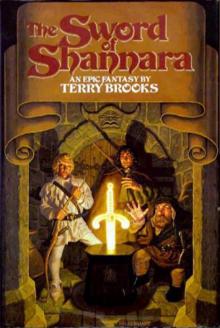 The Sword of Shannara tost-1
The Sword of Shannara tost-1 Paladins of Shannara: The Black Irix (Short Story)
Paladins of Shannara: The Black Irix (Short Story) Tangle Box
Tangle Box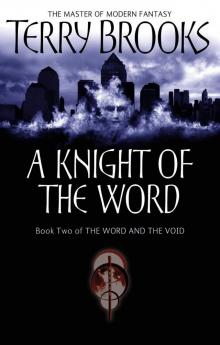 Word & Void 02 - A Knight of the Word
Word & Void 02 - A Knight of the Word The Sword of Shannara, Part 1: In the Shadow of the Warlock Lord
The Sword of Shannara, Part 1: In the Shadow of the Warlock Lord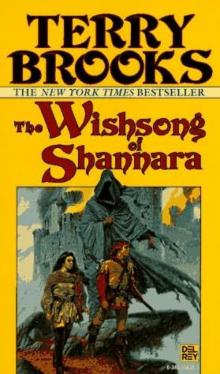 The Wishsong of Shannara tost-3
The Wishsong of Shannara tost-3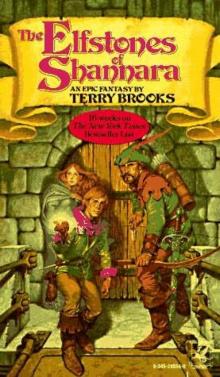 The Elfstones of Shannara tost-2
The Elfstones of Shannara tost-2